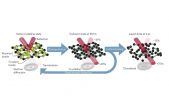Overcoming why a new treatment is resisted by lung cancer
2015-07-29
(Press-News.org) A promising agent for the treatment of cancer has so far had little effect on the most common lung tumours, but new research from The University of Manchester has suggested how this resistance might be overcome.
In two papers released in the journal PNAS, the research team examined factors which mean that the most common type of lung cancer - itself the most common cause of cancer deaths - is resistant to a cytokine called TRAIL that causes cell death in many other types of tumour.
The researchers found that in non-small cell lung cancer, which accounts for around 85 percent of cases, a small RNA molecule called miR-148a is suppressed in TRAIL resistant cells, but that when used together, miR-148a sensitises tumour cells to TRAIL and results in the tumour shrinking.
Dr Michela Garofalo, from the CRUK Manchester Institute led the research. She said: "Discovering a potential reason why TRAIL is resisted by lung cancer could lead us to new treatments for this particularly deadly form of the disease.
"miR-148a certainly seems to play a role in this resistance, so it's an avenue to explore alongside other factors which influence how the tumours respond to treatment."
In related research also published in PNAS, Dr Garofalo's team discovered another mechanism which makes tumours resistant to TRAIL. NF-κB is a protein which TRAIL itself increases the supply of in resistant lung tumours. By supressing it in cells they found that TRAIL became much more effective at causing tumour cells to die.
"TRAIL is currently in clinical trials for other cancer types," added Dr Garofalo. "But little is known about why non-small cell lung cancer is so resistant. These findings begin to shed light on those unique reasons, and suggest that by inhibiting the factors that cause resistance, TRAIL might become a useful treatment."
INFORMATION:
ELSE PRESS RELEASES FROM THIS DATE:
2015-07-29
Mice that have a particular brain chemical switched off become hyperactive and sleep for just 65 per cent of their normal time.
This discovery, published in the journal Neuron, could help researchers to develop new drugs that promote better sleep, or control hyperactivity in people with the medical condition mania.
Scientists altered the neurochemistry of mice to help investigate why we need to sleep, what controls our wakefulness, and how a balance between these two states influences brain functions like concentration and memory and our general health.
The chemicals ...
2015-07-29
From slight sparrows to preening peacocks to soaring falcons, birds have long been known to possess distinct abilities in their sense of smell, but little has been known about the evolution of olfaction.
Now, a large comparative genomic study of the olfactory genes tied to a bird's sense of smell has revealed important differences that correlate with their ecological niches and specific behaviors.
Authors Agostinho Antunes et al., in a new study published in the advanced online edition of Molecular Biology and Evolution, analyzed olfactory receptor genes (OR gene ...
2015-07-29
Physicists at the University of York have revealed a new understanding of nucleosynthesis in stars, providing insight into the role massive stars play in the evolution of the Milky Way and the origins of the Solar System.
Radioactive aluminium (aluminium-26, or Al26) is an element that emits gamma radiation through its decay enabling astronomers to image its location in our galaxy. Studying how Al26 is created in massive stars, scientists have distinguished between previously conflicting assumptions about its rate of production by nuclear fusion.
Funded by the Science ...
2015-07-29
University of Adelaide research has shown for the first time that, despite not having a nervous system, plants use signals normally associated with animals when they encounter stress.
Published today in the journal Nature Communications, the researchers at the Australian Research Council (ARC) Centre of Excellence in Plant Energy Biology reported how plants respond to their environment with a similar combination of chemical and electrical responses to animals, but through machinery that is specific to plants.
"We've known for a long-time that the animal neurotransmitter ...
2015-07-28
Bari, Italy, July 28, 2015 -- A new study by researchers at the University of Bari Aldo Moro, Bari, Italy, Geriatric Unit & Laboratory of Gerontology and Geriatrics, IRCCS "Casa Sollievo della Sofferenza", San Giovanni Rotondo, Foggia, Italy, and Istituto Superiore di Sanità (ISS), Roma, Italy, estimates the association between change or constant habits in coffee consumption and the incidence of mild cognitive impairment (MCI), evaluating 1,445 individuals recruited from 5,632 subjects, aged 65-84 year old, from the Italian Longitudinal Study on Aging (ILSA), a population-based ...
2015-07-28
Rewritable CDs, DVDs and Blu-Ray discs owe their existence to phase-change materials, those materials that change their internal order when heated and whose structures can be switched back and forth between their crystalline and amorphous phases. Phase-change materials have even more exciting applications on the horizon, but our limited ability to precisely control their phase changes is a hurdle to the development of new technology.
One of the most popular and useful phase-change materials is GST, which consists of germanium, antimony, and tellurium. This material is ...
2015-07-28
Hercules, CA -- July 28, 2015 -- Droplet Digital PCR (ddPCR™) has been shown to be a useful tool for the identification of microRNAs (miRNA) circulating in the blood that could serve as potential cancer biomarkers. A study in the journal Oncotarget further supports these findings and identifies a novel miRNA that shows great potential for breast cancer diagnosis. These findings confirm the potential clinical utility of ddPCR technology to precisely and reliably quantify cell-free miRNAs. The study also emphasizes that sample type as well as its preparation are critical ...
2015-07-28
ANN ARBOR--Secondary students found healthier foods on more lunch menus in 2013 than in 2011, resulting in fewer nutrition disparities for small schools or those with racially diverse student bodies.
The findings by University of Michigan researchers show significant improvements made in the National School Lunch Program at public middle and high schools in 2013 after many years of meal disparities based on school size or demographics.
"While these improvements are encouraging, continued progress is needed," said Yvonne Terry-McElrath, a researcher at the U-M Institute ...
2015-07-28
Wild chimpanzees in the forests of Uganda are increasingly eating clay to supplement the minerals in their diet, according to a long-term international study published in the early version of the journal PLOS ONE. The paper led by the University of Oxford describes how the researchers observed wild chimpanzees in the Budongo forest eating and drinking from clay pits and termite mounds. The paper concludes that this change in diet may be partly due to the widespread destruction of raffia palm trees that chimps relied on for their minerals in the past. However, the main reason ...
2015-07-28
(SACRAMENTO, Calif.) -- UC Davis health economists have for the first time projected the total costs of caring for all people with autism spectrum disorder (ASD) in the U.S. for the current calendar year and in 10 years if effective interventions and preventive treatments for the condition are not identified and widely available.
Their forecasts for ASD-related medical, nonmedical and productivity losses are $268 billion for 2015 and $461 billion for 2025. The researchers noted that these estimates are conservative and, if ASD prevalence continues to increase as it has ...
LAST 30 PRESS RELEASES:
[Press-News.org] Overcoming why a new treatment is resisted by lung cancer

